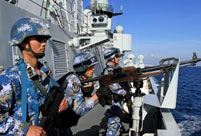 Ni Ni covers BAZAAR JEWELRY
Ni Ni covers BAZAAR JEWELRY
 Cherry blossoms reach peak bloom in Washington D.C.
Cherry blossoms reach peak bloom in Washington D.C.
 Top Chinese fashion icons in foreigners' eyes
Top Chinese fashion icons in foreigners' eyes
 Asia's largest business aviation exhibition to be held in Shanghai
Asia's largest business aviation exhibition to be held in Shanghai
 World's top-rated luxury hotels
World's top-rated luxury hotels
 Wu Jing, Xie Nan to hold wedding on May
Wu Jing, Xie Nan to hold wedding on May
 London Cake International attracts tourists
London Cake International attracts tourists
 Let's dance in harmonic Shaanxi
Let's dance in harmonic Shaanxi
 Christie's to auction dazzling diamonds
Christie's to auction dazzling diamonds
 'Model husband' shatters image of love
'Model husband' shatters image of love
MARITIME STRATEGY, MILITARY REFORM NEEDED
The military experts said the war also exposed China's total ignorance of maritime strategy. This allowed the larger country to be defeated by Japan, which, as an island nation, had always put maritime interests as its supreme strategy.
Ding Yiping said in his article that the ocean concerns the survival, development and honor of the country and its people. State security cannot be ensured if maritime rights cannot be safeguarded.
Paying more attention to the ocean has become one of China's strategies. In July 2013 at a study session with members of the Political Bureau of the Communist Party of China Central Committee, Chinese President Xi Jinping championed efforts to build China into a maritime power.
"Only with a world-class navy can we shoulder the obligations of safeguarding our maritime sovereignty and interests," said Ding, who added that only by embracing the ocean can the Chinese nation have a bright future.
Reflecting on the war, military experts believe that strong armed forces proportionate to a country's size and capable of long-distance projection can not only protect the country, but also turn the territory of an invading country into a battlefield so as to counter its attacks.
Sr. Colonel Guo Fenghai, an NDU professor, wrote that historical lessons showed that military buildup should not be stalled in peacetime. He called for military reforms, especially to the army's computer technology.
China set up a leading group, with Xi Jinping as head, for deepening reform on national defense and the armed forces in March. Xi said "being able to combat and win battles" was the focus of the reform.
The PLA has now launched a great discussion on the standard for combat effectiveness. Earlier this month, 18 top PLA generals voiced support for President Xi's instruction to build a strong military.
THREAT FROM MILITARISM
Ahead of July 25, the 120th anniversary of the start of the Sino-Japanese War, Chinese military analysts see a shadow of militarism lingering in Japan, threatening China's national security in a way that cannot be neglected.
Peng Guangqian, a senior national security policy expert, warned that China must be cautious of and prepared for the rise of militarism in Japan, the society of which bears surprisingly similarities with that of 120 years ago.
The economy was dormant and society was unsteady on July 24, 1894, and before WWII. So it is in today's Japan, Peng said. "Some politicians want to militarize Japan, driving the country's turn to the right."
A country diving into militarism is a trouble-maker in the Asia-Pacific region, a challenger to the status quo and a cradle of war, he said.
According to Peng, China must always guard against the sneak attacks that Japan has a history of making, as it did in launching wars with China, Russia and the United States.
But he believes history will not repeat itself.
Japan sabotaged opportunities for China's development between 1894 and 1937, but China's rejuvenation today can no longer be blocked, the security policy expert wrote.
Peng was echoed by general Liu Yazhou, who regards the 1894 war as a moment to awaken China.
China was defeated, but bearing deep memory of humiliation, the country steadily stepped toward glory. Instead, Japan enjoyed the victory but abused its power in the following decades, which finally led to its failure in WWII, Liu said. "Japan is still an abnormal country."
If Japan does not learn a lesson from history, the country will suffer in the next war, he said.

 Children in ancient costumes learn Zhusuan
Children in ancient costumes learn Zhusuan Tens of thousands celebrate Water Splashing Festival
Tens of thousands celebrate Water Splashing Festival A bite of China II whets the appetite
A bite of China II whets the appetite Chinese frigate completes its 14th escort mission
Chinese frigate completes its 14th escort mission Let's dance in wealthy Shaanxi
Let's dance in wealthy Shaanxi A date with 798: feel the art around you
A date with 798: feel the art around you 3D-printed houses built in Shanghai
3D-printed houses built in Shanghai World largest scale of umbrella dance
World largest scale of umbrella dance Cherry blossoms reach peak bloom in Washington D.C.
Cherry blossoms reach peak bloom in Washington D.C. The backstage of the Fashion Week
The backstage of the Fashion Week College students in Han costumes
College students in Han costumes Postgraduate works as waitress
Postgraduate works as waitress Life in a Lahu village in Yunnan
Life in a Lahu village in Yunnan An orphan’s wedding
An orphan’s wedding Hollywood documentary brings Diaoyu Islands truth to new audience
Hollywood documentary brings Diaoyu Islands truth to new audienceDay|Week|Month